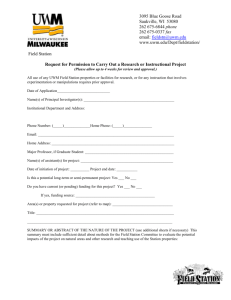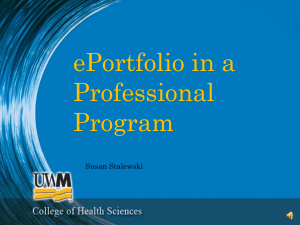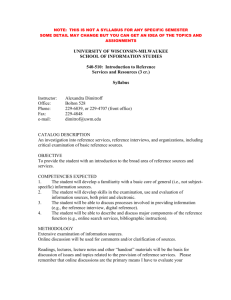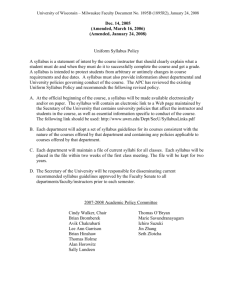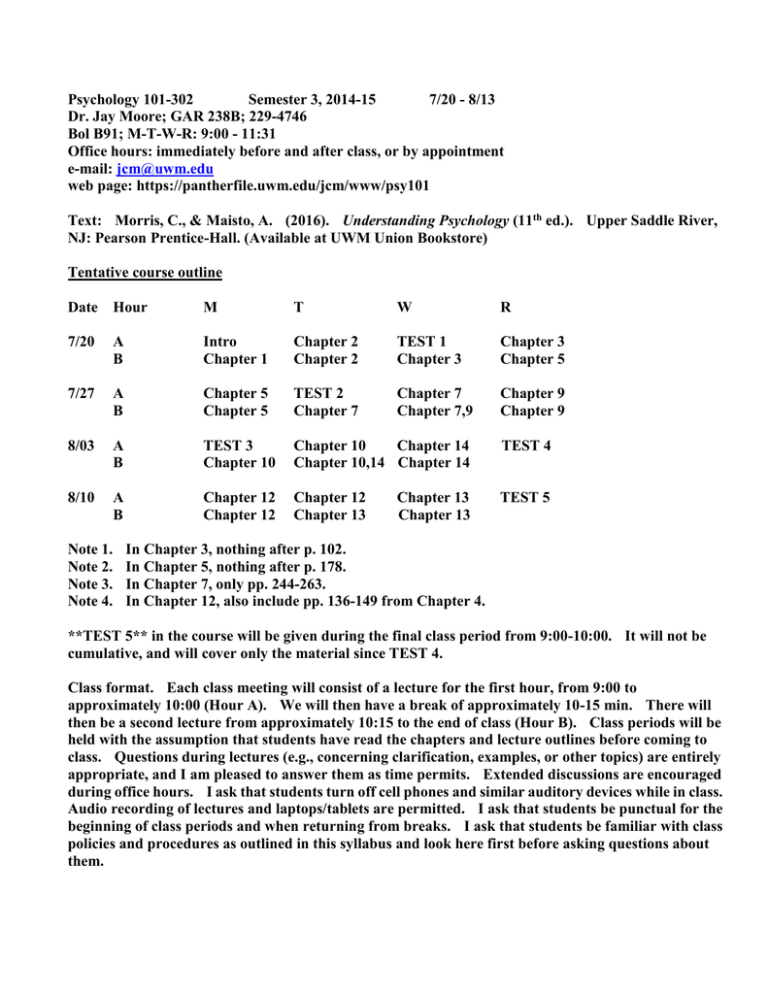
Psychology 101-302
Semester 3, 2014-15
7/20 - 8/13
Dr. Jay Moore; GAR 238B; 229-4746
Bol B91; M-T-W-R: 9:00 - 11:31
Office hours: immediately before and after class, or by appointment
e-mail: jcm@uwm.edu
web page: https://pantherfile.uwm.edu/jcm/www/psy101
Text: Morris, C., & Maisto, A. (2016). Understanding Psychology (11th ed.). Upper Saddle River,
NJ: Pearson Prentice-Hall. (Available at UWM Union Bookstore)
Tentative course outline
Date
Hour
M
T
W
R
7/20
A
B
Intro
Chapter 1
Chapter 2
Chapter 2
TEST 1
Chapter 3
Chapter 3
Chapter 5
7/27
A
B
Chapter 5
Chapter 5
TEST 2
Chapter 7
Chapter 7
Chapter 7,9
Chapter 9
Chapter 9
8/03
A
B
TEST 3
Chapter 10
Chapter 10
Chapter 14
Chapter 10,14 Chapter 14
TEST 4
8/10
A
B
Chapter 12
Chapter 12
Chapter 12
Chapter 13
TEST 5
Note 1.
Note 2.
Note 3.
Note 4.
Chapter 13
Chapter 13
In Chapter 3, nothing after p. 102.
In Chapter 5, nothing after p. 178.
In Chapter 7, only pp. 244-263.
In Chapter 12, also include pp. 136-149 from Chapter 4.
**TEST 5** in the course will be given during the final class period from 9:00-10:00. It will not be
cumulative, and will cover only the material since TEST 4.
Class format. Each class meeting will consist of a lecture for the first hour, from 9:00 to
approximately 10:00 (Hour A). We will then have a break of approximately 10-15 min. There will
then be a second lecture from approximately 10:15 to the end of class (Hour B). Class periods will be
held with the assumption that students have read the chapters and lecture outlines before coming to
class. Questions during lectures (e.g., concerning clarification, examples, or other topics) are entirely
appropriate, and I am pleased to answer them as time permits. Extended discussions are encouraged
during office hours. I ask that students turn off cell phones and similar auditory devices while in class.
Audio recording of lectures and laptops/tablets are permitted. I ask that students be punctual for the
beginning of class periods and when returning from breaks. I ask that students be familiar with class
policies and procedures as outlined in this syllabus and look here first before asking questions about
them.
2
Grading procedure
There are 5 tests in the course. All tests, including Test 5, consist of 50 multiple choice questions
(about 25 questions on each chapter). Each question is worth 2 points, which makes each test worth
100 points and a total of 500 points in the course. The tests are not cumulative, and will cover only the
material since the last test. The sum of points on the 5 tests determines the final grade in the course,
according to the ranges indicated below on this syllabus. I do not grade on a curve, and I do not
eliminate a test with a low score. Extensions are ordinarily not given, and Incompletes are given only
according to UWM policy. About 80% of the questions on a test will draw on material that has been
covered in both lecture and the book. About 10% will draw on material that has been covered only in
lecture, and about 10% will draw on material that is only in the book. There are no extra credit points
in this class during the summer session.
How to determine your grade in this class
The sum of points on the tests determines the final grade in the course, according to the ranges below.
Letter grade (percentages: points)
A
AB+
B
BC+
(100-92%) :
(91-90%) :
(89-88%) :
(87-82%):
(81-80%):
(79-78%):
500-460
459-450
449-440
439-410
409-400
399-390
C (77-72%):
C- (71-70%):
D+ (69-68%):
D (67-62%):
D- (61-60%):
F (59% - ):
389-360
359-350
349-340
339-310
309-300
299-
Note that all points are summed. Letter grades on individual tests aren't averaged.
Copies of relevant course materials (syllabus, handouts, lecture outlines, sample test questions) are
available on the web page for the course (Note: Not D2L).
Absences
All tests, including Test 5, will ordinarily be administered on the day indicated. If students cannot
participate in the course and take the tests on the day indicated because of personal schedules (e.g.,
work, already planned vacations, weddings) I recommend they not enroll. I regret I am not able to
make individual alternative arrangements for students to take tests because of their personal
schedules. If a student misses a test, I reserve the right not to allow a make-up and record 0 points for
the test, or to substitute an essay test of comparable point value (e.g., four 25-point essay questions).
In general, make-ups are permitted when the original test is missed for reasons beyond the student's
control, acts of God, military obligations, etc. Inattention, personal convenience, oversleeping, leaving
early for vacations, returning late from vacations, weddings, and lack of planning are ordinarily not
acceptable reasons for make-ups. Because the test days are indicated in the syllabus, I expect students
to adjust their personal schedules accordingly. Students with an acceptable reason who know in
advance they will not be in class to take a test should contact me as soon as possible to avoid any
misunderstanding. If a student is allowed to make up a missed test, the test must be made up before
the next test in the course. If it is not made up, the score will lapse to 0. I do not remind students to
make up missing tests. Students should take extra care that work schedules and family vacations do
3
not conflict with course requirements, especially around holidays and the end of the course. Note that
the policy for individual tests during the course and Test 5 means that students cannot take the exams
at a different time because they are leaving for vacation, they have already purchased their tickets,
their parents are leaving, they need to meet their vacation partner(s) at the vacation destination, etc.
The policy regarding student absences on test days is explained in full on a separate handout on the
web page for the course.
Contacting me. The telephone number on the syllabus is the department office. The secretary will
transfer your call, take a message, or an answering machine will record your message. If you would
like me to call you back, please specify the time when you are available. My email address is listed on
this syllabus. I do not answer emails if they lack a subject heading, or if the question pertains to
something that is clearly in the syllabus, such as my policy concerning not answering emails about
student grades. Note that because of the confidentiality of student records, my policy is not to respond
to requests by e-mail or telephone and give out grades on individual tests, updates as to current grades,
or final grades at the end of the semester. The course is fully designed to let students keep track of
their own grades by correcting their own tests according to posted answer keys and adding up their
points. Students are encouraged to do so. If students nevertheless have questions about their grades
or status at any point in the course, they are welcome to visit me during my office hours or some other
mutually agreeable time.
Miscellaneous
This syllabus is designed to present an overview of the course, and to communicate course policies and
procedures. The dates are tentative and subject to change or correction. Every effort will be made to
keep to the schedule presented in the syllabus, although unforeseen emergencies may require changes.
Any such changes will be announced and will be effective at the earliest reasonable opportunity.
Students are responsible for any information presented in a class meeting or portion of class meeting in
which they are absent, including changes of schedule and test days. Students are specifically advised
against attempting to take the course by just showing up on test days identified in the tentative course
outline above. An estimate of the time requirements for this course is on the web page for the course
in the Administrative folder and at the end of this syllabus.
Add/Drop policy: Students may add/drop this course according to UWM policy. The UWM PAWS
system is available for such actions. I do not need to sign a drop form. Please note that you cannot
drop a course simply by deciding not to attend. You will receive an F unless you act to formally and
explicitly drop the course.
Academic misconduct: Students are reminded that academic misconduct warrants dismissal from the
course with the grade of F. Examples of academic misconduct include but are not limited to the
following: (a) copying or attempting to copy the work of another during a test; (b) unauthorized
communication or attempt to communicate with another person during the test for the purpose of
obtaining an answer to a test question; (c) using unauthorized material during a test, such as notes or
crib sheets.
Information on Psychology Department policies regarding accommodations for students with
disabilities, accommodation for students with sincerely held religious beliefs, academic misconduct,
4
complaint procedures, grade appeal procedures, and other standing policies (e.g., sexual harassment,
incompletes) is available in the main office of the Psychology Department in GAR 224. Students
requesting accommodations to meet any of the requirements of this course should contact me as soon
as possible.
Students with disabilities. Verification of disability, class standards, the policy on the use of alternate
materials and test accommodations can be found at the following:
http://www.uwm.edu/Dept/DSAD/SAC/SACltr.pdf
Religious observances. Policies regarding accommodations for absences due to religious observance are
found at the following: http://www.uwm.edu/Dept/SecU/acad%2Badmin_policies/S1.5.htm
Students called to active military duty. Accommodations for absences due to call-up of
reserves to active military duty can be found at the following:
http://www3.uwm.edu/des/web/registration/militarycallup.cfm
Incompletes. The conditions for awarding an incomplete to graduate and undergraduate students can
be found at the following: http://www.uwm.edu/Dept/SecU/acad%2Badmin_policies/S31.pdf
Discriminatory conduct (such as sexual harassment). Definitions of discrimination. Harassment, abuse
of power, and the reporting requirements of discriminatory conduct are found at the following:
http://www.uwm.edu/Dept/SecU/acad%2Badmin_policies/S47.pdf
Academic misconduct. Policies for addressing students cheating on exams or plagiarism can be found at
the following:
http://www.uwm.edu/Dept/OSL/DOS/conduct.html
Complaint procedures. Students may direct complaints to the head of the academic unit or department
in which the complaint occurs. If the complaint allegedly violates a specific university policy, it may be
directed to the head of the department or academic unit in which the complaint occurred or to the
appropriate university office responsible for enforcing the policy.
Grade appeal procedures. Procedures for student grade appeal appear at the following:
http://www.uwm.edu/Dept/SecU/acad%2Badmin_policies/S28.htm
Final examination policy. Policies regarding final examinations can be found at the following:
http://www.uwm.edu/Dept/SecU/acad%2Badmin_policies/S22.htm
5
On average, students should expect to make at least the following time commitment in this course:
Class contact (lecture):
Reading assigned chapter:
Reading assigned lecture outline/supplementals:
Preparing for tests:
Taking tests:
Reviewing tests:
(time/each) x (frequency) = total hours
1 hour x 25 = 25 hours
3 hours x 10 = 30 hours
2 hours x 10 = 20 hours
4 hours x 5 = 20 hours
1 hour x 5 = 5 hours
1 hour x 5 = 5 hours
Total semester commitment (including reviewing for final and time taking final) = ~ 105 hours



